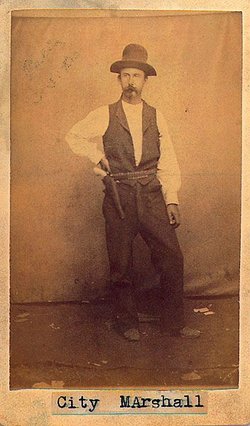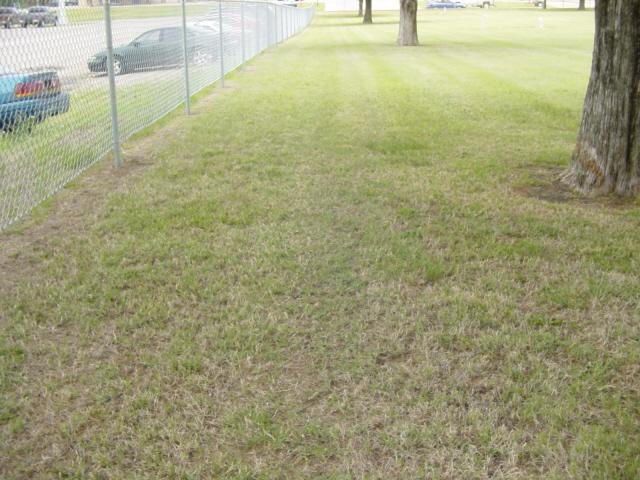(The above obituary was provided by Contributor George Bacon)
Sumner County Press, Thursday, July 30, 1874:
"DEAD! DEAD!! DEAD !!!"
"The Vigilants at Work"
"Three men Hanged by the Neck until they are Dead"
"A fearful Retribution"
"The Beginning of the End"
"Last night about 12 o'clock the calaboose in this city in which the prisoners elsewhere spoken of, were confined, was surrounded by a large party of armed and mounted men who after they had overpowered and disarmed the guards, took there from L.B. Hasbrouck, W.I. Brooks and Charley Smith, with whom they at once proceeded in the direction of Slate Creek Bridge. This morning the lifeless bodies of the three ill-fated men are dangling from the same tree. With others of our citizens we, early this morning, visited the spot and looked for a moment upon the ghastly spectacle. The bodies were hanging facing the south. Hasbrouck was on the left, Brooks in the center and Smith to the right and nearest to the tree. The distorted features of Brooks gave evidence of a horrible struggle with death. The other men looked naturally, and evidently died easily. A coroner's jury has been empanelled and as we go to press, an inquest is being held. Brooks' wife is in town, having arrived from Caldwell yesterday. Hasbrouck was a member of the Sumner County bar, and unmarried, Smith (an alias) has but one arm, and is believed to be a son of Ex-Governor Edwards of Illinois."
Sumner County Press, Thursday, August 8, 1874:
"...Several times during the past two years, have the people of the southern part of the county organized for the protection of their stock, and the intimidation of the thieves succeeding in holding them in check only so long as they were vigilant in their efforts in this direction. A relaxation of vigilance was however, ever followed by a repetition of the depredations, so that the excitement along the border was always kept at about fever heat. This was the state of affairs on the first of July, when the South Western Stage Company having terminated their mail contract between Caldwell and Fort Sill, were to be succeeded by Vail & Co., who began to stock the line. The former company were withdrawing their men and stock and were followed up the trail by a horde of camp followers, some of whom were the most abandoned characters of the frontier, who concentrated at Caldwell. On the night of the 29th of June, four mules belonging to the new contractors, Vail & Co., and a horse belonging to A.E. Fletcher, were stolen from Judd Calkins' livery barn in Caldwell, and though Fletcher's horse was coolly returned to him all efforts to track the mules proved futile, notwithstanding Mr. Williamson, the agent of the company, used every means at his command. The same night three mules belonging to the same company were stolen from the first station below Caldwell, one of which was killed with its rider, William Watkins, two days after, a few miles below Mosier's ranch. In addition to these successful raids, attempts were made to steal the stock belonging to the new company, at all the stations on the line, all of which were frustrated by the Indians unexpectedly showing their hand, Brooks and Smith, two of the men hanged here, participated actively in the raids on the stations. But we have not the space for an extended history of the operations of the thieves for a few weeks subsequent to the beginning of the Indian troubles that drove them out of the Territory, to a fancied safe refuge in Caldwell-nor for a recital of the events that led to a disclosure of the facts that led to the discovery of the place where the mules were concealed, and their subsequent capture by Sheriff Davis. It is sufficient for our purpose to state that evidence was developed, implicating numerous parties not only in this later theft, but showing them up as principals and accessories in the thieving transactions of the border for the past two years; and proving beyond a question of doubt that they were part of the regularly organized gang, whose operations extend from the Mississippi to the Mountains."
(The above obituary was provided by Contributor George Bacon)
Sumner County Press, Thursday, July 30, 1874:
"DEAD! DEAD!! DEAD !!!"
"The Vigilants at Work"
"Three men Hanged by the Neck until they are Dead"
"A fearful Retribution"
"The Beginning of the End"
"Last night about 12 o'clock the calaboose in this city in which the prisoners elsewhere spoken of, were confined, was surrounded by a large party of armed and mounted men who after they had overpowered and disarmed the guards, took there from L.B. Hasbrouck, W.I. Brooks and Charley Smith, with whom they at once proceeded in the direction of Slate Creek Bridge. This morning the lifeless bodies of the three ill-fated men are dangling from the same tree. With others of our citizens we, early this morning, visited the spot and looked for a moment upon the ghastly spectacle. The bodies were hanging facing the south. Hasbrouck was on the left, Brooks in the center and Smith to the right and nearest to the tree. The distorted features of Brooks gave evidence of a horrible struggle with death. The other men looked naturally, and evidently died easily. A coroner's jury has been empanelled and as we go to press, an inquest is being held. Brooks' wife is in town, having arrived from Caldwell yesterday. Hasbrouck was a member of the Sumner County bar, and unmarried, Smith (an alias) has but one arm, and is believed to be a son of Ex-Governor Edwards of Illinois."
Sumner County Press, Thursday, August 8, 1874:
"...Several times during the past two years, have the people of the southern part of the county organized for the protection of their stock, and the intimidation of the thieves succeeding in holding them in check only so long as they were vigilant in their efforts in this direction. A relaxation of vigilance was however, ever followed by a repetition of the depredations, so that the excitement along the border was always kept at about fever heat. This was the state of affairs on the first of July, when the South Western Stage Company having terminated their mail contract between Caldwell and Fort Sill, were to be succeeded by Vail & Co., who began to stock the line. The former company were withdrawing their men and stock and were followed up the trail by a horde of camp followers, some of whom were the most abandoned characters of the frontier, who concentrated at Caldwell. On the night of the 29th of June, four mules belonging to the new contractors, Vail & Co., and a horse belonging to A.E. Fletcher, were stolen from Judd Calkins' livery barn in Caldwell, and though Fletcher's horse was coolly returned to him all efforts to track the mules proved futile, notwithstanding Mr. Williamson, the agent of the company, used every means at his command. The same night three mules belonging to the same company were stolen from the first station below Caldwell, one of which was killed with its rider, William Watkins, two days after, a few miles below Mosier's ranch. In addition to these successful raids, attempts were made to steal the stock belonging to the new company, at all the stations on the line, all of which were frustrated by the Indians unexpectedly showing their hand, Brooks and Smith, two of the men hanged here, participated actively in the raids on the stations. But we have not the space for an extended history of the operations of the thieves for a few weeks subsequent to the beginning of the Indian troubles that drove them out of the Territory, to a fancied safe refuge in Caldwell-nor for a recital of the events that led to a disclosure of the facts that led to the discovery of the place where the mules were concealed, and their subsequent capture by Sheriff Davis. It is sufficient for our purpose to state that evidence was developed, implicating numerous parties not only in this later theft, but showing them up as principals and accessories in the thieving transactions of the border for the past two years; and proving beyond a question of doubt that they were part of the regularly organized gang, whose operations extend from the Mississippi to the Mountains."
Gravesite Details
Buried without a stone in the southwest corner section of the cemetery.
Advertisement
Advertisement



